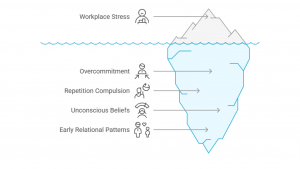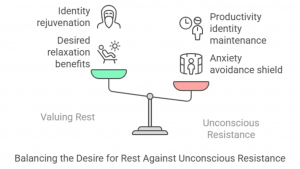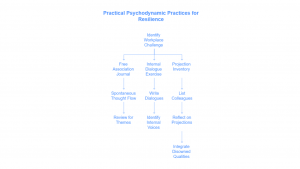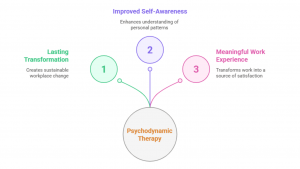Ever walked into the office and felt that knot in your stomach tighten the moment your boss mentions “urgent meeting”? Or maybe you’ve stared at your screen at 7 PM, wondering how you’ll possibly meet tomorrow’s deadline while your coworkers have long gone home?
Yeah, me too. More times than I care to admit.
I remember sitting in my cubicle three years ago, hiding in the bathroom just to breathe after a particularly brutal client call. I thought I was the only one struggling while everyone else seemed to glide effortlessly through workplace chaos. Spoiler alert: I wasn’t alone, and neither are you.
Learning how to build resilience at work saved not just my career but quite possibly my sanity. What I discovered along the way surprised me, the personality traits I once considered weaknesses actually contained the seeds of my strongest resilience skills.
Whether you’re drowning in emails, dealing with a micromanaging boss, or simply feeling that constant undercurrent of workplace anxiety, this isn’t about “toughing it out” or “pushing through.” It’s about something far more sustainable and, honestly, life-changing.
Let Citizen of the world share what we’ve learned from both spectacular failures and unexpected comebacks in offices spanning four continents. Because the ability to bounce back isn’t just nice to have—in today’s workplace, it’s absolutely essential for survival.
What is Resilience?

You know that colleague who seems absolutely unflappable? The one who responds to company restructuring announcements with a calm nod while you’re mentally updating your resume and spiraling into panic?
I used to think resilience meant being that person, someone who simply doesn’t feel stress or fear. Someone fundamentally different from me.
I was dead wrong.
Psychological resilience isn’t emotional Teflon where nothing sticks. It’s not about being fearless. It’s about feeling the fear, experiencing the stress, acknowledging the uncertainty, and then finding a way forward anyway.
Research backs this up. The American Psychological Association defines resilience as “the process of adapting well in the face of adversity, trauma, tragedy, threats or significant sources of stress.” Note the word “process”, not a personality trait you either have or don’t. [1]
And here’s what nobody tells you: those colleagues who appear unshakable? They’re stressed too. They’ve just developed better systems for processing and responding to that stress. Systems you can learn.

The Origins of Our Stress Responses
What many workplace resilience guides miss is how deeply our stress responses are rooted in our earliest experiences. Dr. Allan Schore’s research on affect regulation shows that our capacity to manage stress begins forming in infancy through interactions with caregivers (Schore, 2015). Those early patterns become neurologically embedded, creating our default stress response templates.
Understanding resilience through this developmental lens helps explain why generic advice often fails. Your stress response isn’t simply a reaction to current events, it’s filtered through a complex personal history that deserves compassionate understanding rather than harsh judgment.
The Hidden Dynamics: Your Unconscious Relationship with Stress
What makes workplace stress particularly challenging is that most of its dynamics operate beneath our conscious awareness. According to psychodynamic theory, our reactions to workplace pressure are often defensive responses shaped by unconscious conflicts and early relational patterns (Kets de Vries, 2014).
Take Maya, a capable team leader who found herself perpetually volunteering for additional responsibilities despite being overwhelmed. Through exploration, she recognized this pattern stemmed from an unconscious belief that her value depended entirely on helping others, a narrative formed in childhood as the responsible eldest daughter in a struggling family.
These unconscious processes create what psychologists call “repetition compulsion”, the tendency to recreate familiar (though uncomfortable) patterns even when they’re no longer serving us. This explains why many of us keep encountering the same workplace challenges despite our best conscious efforts to change.
As psychoanalyst Adam Phillips notes, “We are all, in some sense, trying to recover the past in the present, trying to find in the world what we once knew in ourselves.” Our workplace struggles often reflect this unconscious search for resolution of earlier experiences.

Why Your Personality Type Changes Everything About Resilience
Remember those personality tests your HR department made everyone take during that team-building retreat? Turns out they might be more useful than you thought, especially when it comes to building resilience.
The resilience trap many of us fall into is trying to adopt strategies that work wonderfully—
Stress-Proof Your Career: Uncovering the Hidden Dynamics of Workplace Resilience
Ever walked into the office and felt that knot in your stomach tighten the moment your boss mentions “urgent meeting”? Or maybe you’ve stared at your screen at 7 PM, wondering how you’ll possibly meet tomorrow’s deadline while your coworkers have long gone home?
Yeah, me too. More times than I care to admit.
I remember sitting in my cubicle three years ago, hiding in the bathroom just to breathe after a particularly brutal client call. I thought I was the only one struggling while everyone else seemed to glide effortlessly through workplace chaos. Spoiler alert: I wasn’t alone, and neither are you.
Defense Mechanisms and Work Stress
What’s fascinating about personality differences in stress responses is how they reflect our preferred defense mechanisms, the unconscious psychological strategies we use to protect ourselves from anxiety. These defenses function as a psychological immune system, but like our physical immune system, they can sometimes overreact or target the wrong threats.
Research by George Vaillant (2011) categorizes defenses from immature (like denial) to mature (like humor). Your personality type strongly influences which defenses you naturally employ. [3]
Understanding your default defense mechanisms doesn’t mean abandoning them. Rather, it means developing awareness of when they’re helping versus when they’re creating blind spots in your resilience strategy.
The Unconscious Resistance to Recovery
What’s particularly intriguing about our recovery deficit is that many of us unconsciously resist true rest despite consciously valuing it. Psychodynamic theory helps explain this paradox through the concept of secondary gains, unconscious benefits we receive from seemingly self-destructive behaviors (Freud, 1926).[1]
For many professionals, constant busyness provides psychological benefits beyond productivity:
- Protection from anxiety about deeper life questions
- Avoidance of challenging relationship dynamics
- Maintenance of identity rooted in productivity
- Fulfillment of internalized expectations about worth and value
James, a consultant who consistently worked 70-hour weeks despite deteriorating health, discovered through reflective work that his hyperwork pattern protected him from confronting a growing sense of purposelessness. Work overload wasn’t just a scheduling problem, it functioned as an elaborate psychological defense.
Similarly, researcher Brené Brown notes that “exhaustion has become a status symbol” in modern work culture. Many professionals unconsciously resist recovery because busyness has become equated with importance and value.

Practical Psychodynamic Practices for Deeper Resilience
Beyond behavioral techniques, these practices drawn from psychodynamic approaches create more sustainable resilience by addressing unconscious patterns:
The Free Association Journal
- Set aside 15 minutes in a private space
- Begin with a specific workplace challenge (e.g., “My reaction to yesterday’s feedback”)
- Write continuously without censoring, editing, or judging
- Note where your mind wanders, these associations often reveal unconscious connections
- Review after completing to identify themes, patterns, and unexpected connections
This practice, based on Freud’s free association technique, helps uncover unconscious material influencing your workplace responses. Unlike structured journaling, it focuses on the spontaneous flow of thoughts to bypass conscious filtering.
The Internal Dialogue Exercise
- Identify a recurring workplace situation that triggers disproportionate stress
- Create a written dialogue between different parts of yourself responding to this situation
- Let each part speak freely without judgment or correction
- Look for voices that echo significant figures from your past
- Notice which parts dominate and which are silenced
Based on psychoanalyst Richard Schwartz’s Internal Family Systems approach, this exercise helps identify internalized relationships and voices influencing your workplace experiences. Many professionals discover that their harshest workplace critic actually resides within, not in external feedback. [2]

The Projection Inventory
- List colleagues who consistently trigger strong positive or negative reactions
- For each, note specific qualities that elicit these reactions
- Reflect: “How might these represent disowned aspects of myself?”
- Consider how integrating these qualities might transform your resilience
This exercise, drawing on Jung’s concept of projection, helps identify how workplace relationships often mirror unconscious material. The colleague whose confidence infuriates you may represent disowned assertiveness you need to reclaim for complete resilience.

How Psychodynamic Psychotherapy Transforms Workplace Resilience
While many workplace resilience approaches focus solely on behavior change, psychodynamic psychotherapy offers a deeper pathway that addresses the unconscious roots of stress responses. By uncovering and working through unconscious patterns, this approach creates more sustainable transformation than surface-level interventions alone.
The Therapeutic Journey: Beyond Symptom Management
Psychodynamic therapy differs fundamentally from short-term approaches by focusing not just on reducing workplace anxiety but on understanding its origins and meaning. This deeper exploration creates lasting change rather than temporary relief.
“The difference is like treating a garden,” explains Dr. Elena Morozova, a psychoanalytic psychotherapist specializing in workplace issues. “Cognitive techniques might remove visible weeds, but psychodynamic work examines the soil itself, the unconscious conditions producing those struggles. This creates sustainable transformation rather than requiring constant maintenance.”
The Process: Uncovering Your Personal Narrative
Psychodynamic psychotherapy for workplace resilience typically includes:
- Exploring relational patterns
- Identifying defense mechanisms
- Working through transference
- Developing reflective function
When to Consider This Approach
Psychodynamic therapy may be particularly valuable when:
- You notice recurring patterns despite awareness and effort to change
- Workplace situations trigger emotional responses disproportionate to events
- You find yourself repeating relationship dynamics with different colleagues
- Success seems to make you uncomfortable or leads to self-sabotage
- Your professional identity feels fragmented or uncertain
Many professionals report that while they initially sought therapy for specific workplace challenges, the process ultimately transformed their entire relationship with work, from something merely endured to a source of genuine meaning and satisfaction.
As psychoanalyst Stephen Grosz writes, “We can only change once we accept that there is something to change.” Psychodynamic approaches create this awareness without the self-blame that often accompanies workplace struggles.

A Final Reflection: The Courage to Know Yourself
Perhaps the most profound insight from psychodynamic approaches to resilience is captured in Freud’s core principle: “Where id was, there ego shall be.” Translated into contemporary language: true resilience comes from bringing unconscious patterns into conscious awareness where they can be transformed.
This journey requires courage, the willingness to examine uncomfortable truths about ourselves and our work patterns. Yet this courage yields rewards far beyond mere stress management. It creates the foundation for authentic professional presence and lasting career satisfaction.
[1]https://en.wikipedia.org/wiki/Resistance_%28psychoanalysis%29
[2] https://ifs-institute.com/
[3] https://pubmed.ncbi.nlm.nih.gov/21346631/
